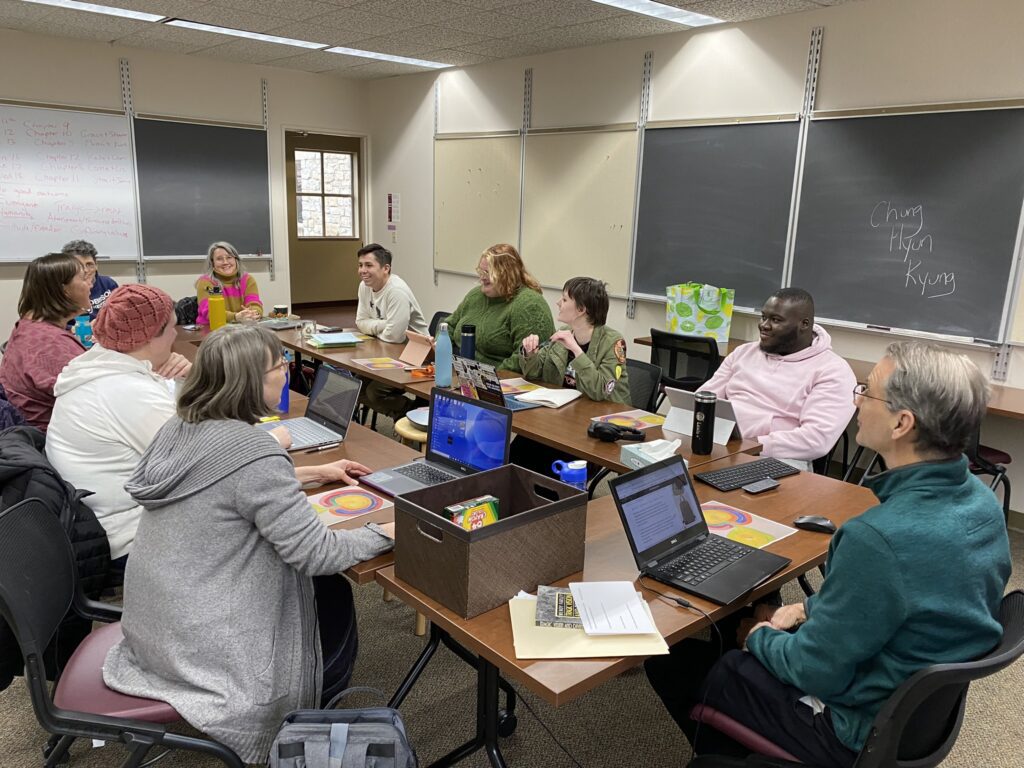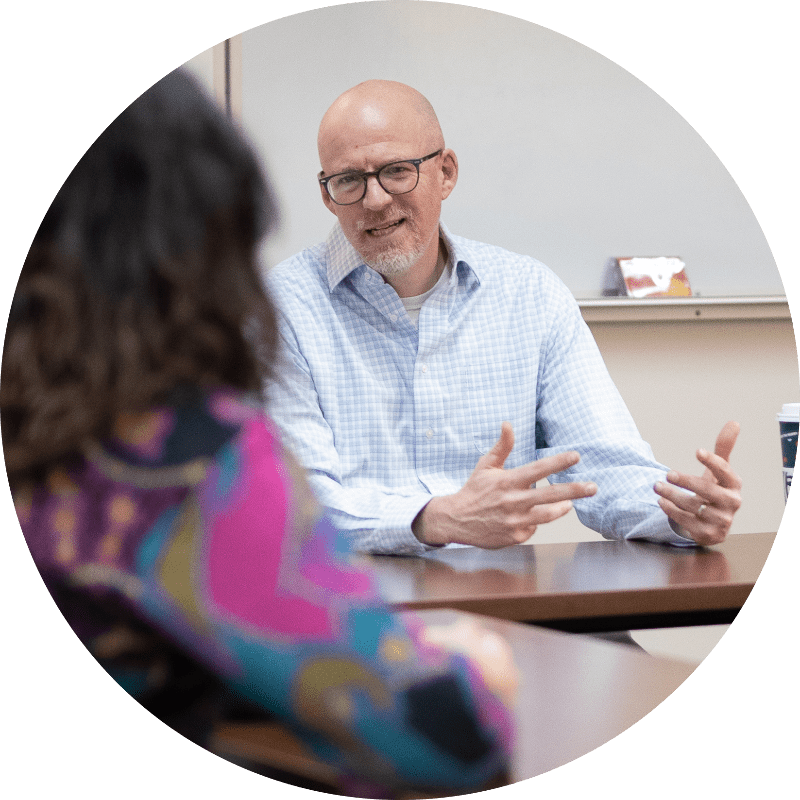Master of Arts in Theopoetics and Writing
A degree in theopoetics and writing (MATW), the first of its kind at a seminary, enables you to focus study in ways that celebrate mystery, metaphor and meaning in texts and contexts for expansive reflection, critical engagement and various forms of writing. The MATW joins theology, poetry, narrative, spirituality and public conversations together in the pursuit of inquiry and understanding that result in creative production across multiple genres.
This program is offered jointly with Bethany Theological Seminary (students enter and complete the program either as an ESR or a BTS student). Although ESR and Bethany represent two distinct traditions—Quaker and Church of the Brethren—we share a common Peace Church tradition. While we have been partner schools since 1994, the theopoetics and writing degree represents a new level of collaboration.

PROGRAM OBJECTIVES AND OUTCOMES
The Master of Arts: Theopoetics and Writing is designed to enhance students’ ability to write and think at the intersection of creativity, faith, and meaning. Along with academic study, it trains students in various forms of written communication and other media that bring spirituality into public conversation with the whole of life. This program requires 36 hours of coursework directly connected to the study of theopoetics and writing.
As a graduate from the MATW program, you will be prepared to:
1. Hone skills in different genres and mediums of theopoetics and writing.
a. Exhibit knowledge and understanding of the content and method of various genres, such as narrative, poetry, fiction, creative nonfiction, essay, scholarly argument, visual arts, and public speaking.
b. Recognize and explain theopoetic moves in multiple mediums.
c. Engage in linguistic creativity as a formative spiritual practice, both for communities and for individual lives, including one’s own.
2. Describe the connection between theology and the imagination.
a. Identify the various conversations within theopoetics in terms of method, meaning, and value.
b. Describe one’s own theological imagination informed by theological investigation.
c. Articulate connections across theology, theopoetics, and the arts that are critical, generous, and creative.
3. Integrate learning that is interdisciplinary, intercontextual, and imaginative across theology, theopoetics, and the arts.
a. Demonstrate critical awareness of one’s own context and the ways in which different genres and mediums operate in the lives of readers in other contexts, in ministry, and in work for peace and justice.
b. Assess diverse, lived possibilities of theopoetics in different contexts, such as justice advocacy, peacemaking, and community living.
c. Analyze, critique, and synthesize diverse frameworks and insights related to theology, theopoetics, and the arts in dialogue with creative and scholarly partners.
4. Demonstrate expertise in theology, theopoetics, and the arts in a select number of genres and/or mediums as exhibited in a cumulative project.
a. Exhibit extensive knowledge of content relevant to project goals.
b. Employ various genres and/or mediums appropriate to one’s project goals.
c. Show expertise in the writing process, including creative idea generation, drafting, receiving and giving feedback, revision, and presentation for public engagement.
Note: The subpoints under each Program Objective are illustrative. Not all of the subpoints are required to be assessed in each course working at the specific Program Objective, and for individual lives, including your own.
apply intellectual disciplines, skills, and creative processes that empower you to practice your writing publicly in ways appropriate to specific genres, audiences, and purposes.
demonstrate theopoetic understanding of method, meaning, and value, with attention to their function in the public sphere and connections to the cultural context.
explore and articulate diverse, lived possibilities of theopoetics, such as literary craft, popular writing, justice advocacy, peacemakin,g and community building.
Take a Course When You Need It
We understand that not every student is able to commit to a full-time program of graduate study, but that shouldn’t be a constraint if you’re interested in taking seminary courses for professional or personal reasons. This is why we provide the option of applying for admission to our Occasional Student Program and registering for residential or Access classes.
As an Occasional Student, you may take any ESR 100 or 200 level course, or if you have the appropriate educational background, you may take 300 level courses with the permission of the instructor. Occasional students may take as many as two courses per semester.
Please note that students in this program are subject to the same academic performance requirements as M.Div., M.A. and Certificate students.
Program details
Drawing on the strengths of ESR’s Ministry of Writing Program and Bethany Theological Seminary’s theopoetics curriculum, the MATW degree was developed through a collaboration by both schools. The degree is offered independently by both ESR and Bethany and requires 36 credits (twelve 3-credit-hour courses) of course work directly connected to the study of theopoetics and writing. The 36 hours will include prerequisites for required courses.
At ESR it may be done residentially or through our distance education program, Access. There is no residency requirement for Access students; however, recipients of the Quaker Professional Scholarship must take one residential intensive course.
MA summative exercise (thesis/portfolio/project in final semester)
- Theopoetics 1
- Theopoetics 2
- Two 200-level writing courses from list below
- Three other courses from list below
These may come from the list below or may be any course offered by either ESR or Bethany.
- Writing the Story
- Creative Nonfiction
- Writing Public Theology
- Writing for God and God’s People
- Writing Mental Illness/Writing as Mindfulness
- Writing Seminar
- Applied Storytelling
- Peace of the City and Quest for Public Theology
- Narrative Theology
- Science Fiction and Theology
- Modernity, Postmodernity, and Belief
- The Theological Imagination
- Theology and Preaching
- Preaching, Theopoetics, and Society
- Preaching, Poetry, and Prophetic Imagination
- Writing Midrash
- Spirituality courses, ESR
- Readings course, Bethany
- Poetry
- Digital Genres
- Hebrew Bible Theopoetics
- Poetics of Jesus
- Survey of Christian Poetry

Our faculty
The MATW degree is led by ESR’s own Ben Brazil, assistant professor and director of the ministry of writing program and Bethany Theological Seminary’s Scott Holland, Slabaugh Professor of Theology and Culture and Director of Peace Studies and Cross-Cultural Studies.
Next steps
Ministry isn’t just a vocation or a calling—it’s a way of being in this world, seeking to make it whole. ESR is ready to support you in answering your own call to ministry, whatever shape it takes.